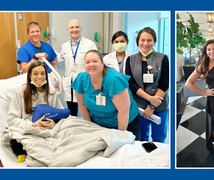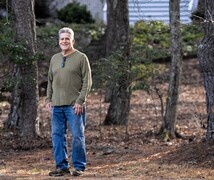Duke heart specialists treat atrial fibrillation with minimally invasive and complex procedures at Duke Raleigh Hospital's catheterization lab. Before it opened, patients were brought to Duke University Hospital in Durham. Now Wake County patients are treated closer to home.
Mike Reider of Raleigh describes atrial fibrillation like this: "It makes you feel like your heart is going to go somewhere it doesn’t belong."
A-fib, as it's often called, is an irregular heartbeat. It's the the most common type of cardiac arrhythmia, or heart rhythm disorder. “Often, patients will feel fluttering or palpitations in their chest, but the symptoms can also be quite subtle,” says Kevin Jackson, MD, a heart rhythm specialist with Duke Cardiology of Raleigh. “Feelings of shortness of breath, fatigue, or dizziness may be due to an arrhythmia, and a simple EKG [electrocardiogram] or cardiac monitor will help diagnose this.”
Some benign, asymptomatic heart rhythm problems don’t require any treatment. “For more serious or symptomatic conditions, we have the choice of starting a medication or pursuing a cure with catheter ablation,” he explains.
The risks of leaving a heart rhythm disorder untreated can range from an elevated heart rate to a weakening of the heart muscle and blood clots, which increase the risk of stroke.
After 15 years taking medicine - an aspirin regimen and medicines to slow his heart beat to control his A-fib - the condition started affecting Reider's quality of life. It "really saps your energy,” he says. “Your pulse rate increases; mine would go up as high as 140. It’s hard to concentrate. It raises your anxiety levels.” His episodes generally lasted two to three hours, although one lasted a full 24 hours. After suffering a mild stroke, in May 2012, Reider was put on warfarin (Coumadin) to prevent blood clots. Shortly after, his doctor referred him to Mark Leithe, MD, a heart specialist at Duke Cardiology of Raleigh, who referred him to Jackson. He recommended Reider undergo a catheter ablation, a minimally invasive procedure that uses a catheter to burn away unwanted tissue. Jackson performed Reider's ablation in Duke Raleigh Hospital's biplane catheterization lab.
“Previously, we would bring patients to Duke Hospital in order to use these advanced technologies," explained Jackson. "Now we have an identical facility available at Duke Raleigh. “The lab allows us to do complex ablations, including atrial fibrillation ablation, closer to home for Wake County patients.”
Reider wanted the facts before he agreed to the procedure. And he wanted to know he was in good hands. "My brother’s a retired surgeon in California,” he says. “He told me, ‘You really want to get someone who’s done a lot of these.’ And I did. Dr. Jackson explained [the ablation] to me—the risks involved, the fact that it works about 75 percent of the time,” Reider says. “I was really impressed with his ability to anticipate my questions. He made me feel like I was his only patient for the day. I had great confidence in him.”
Reider had the ablation on November 13, 2012. “First, they did an MRI of my heart, which they can see in 3D. That led doctors to discover I had three veins going into my heart instead of four, which most people have. That was very important to know. A day before the procedure, I had a transesophegeal echocardiogram, or TEE, to determine I didn’t have any blood clots. The ablation itself was a four-hour procedure. They go in your blood vessels through your legs to your heart.” He was out of the hospital the day after the procedure and back at work within a few days.
“After the procedure, I thought, wow, they used to have to do this through open-heart surgery,” he says.
As Reider knows, matters of the heart can never be taken lightly, but now—thanks to Duke Raleigh’s facility—they can be treated close to home.





